Enhancing Self-Confidence through Occupational Cooking Therapy
VerifiedAdded on 2020/05/28
|15
|3654
|74
AI Summary
Occupational therapy plays a pivotal role in enhancing daily life activities, including cooking. This occupation is crucial for building self-confidence and promoting independence. Occupational therapists employ various strategies such as modifying kitchen structures and providing specialized equipment to facilitate these skills. These interventions are particularly beneficial for individuals with physical or mental health challenges, enabling them to fulfill roles like food providers within their households. Through tailored therapeutic approaches, occupational therapy not only aids in skill development but also contributes significantly to the overall quality of life by fostering self-reliance and confidence.
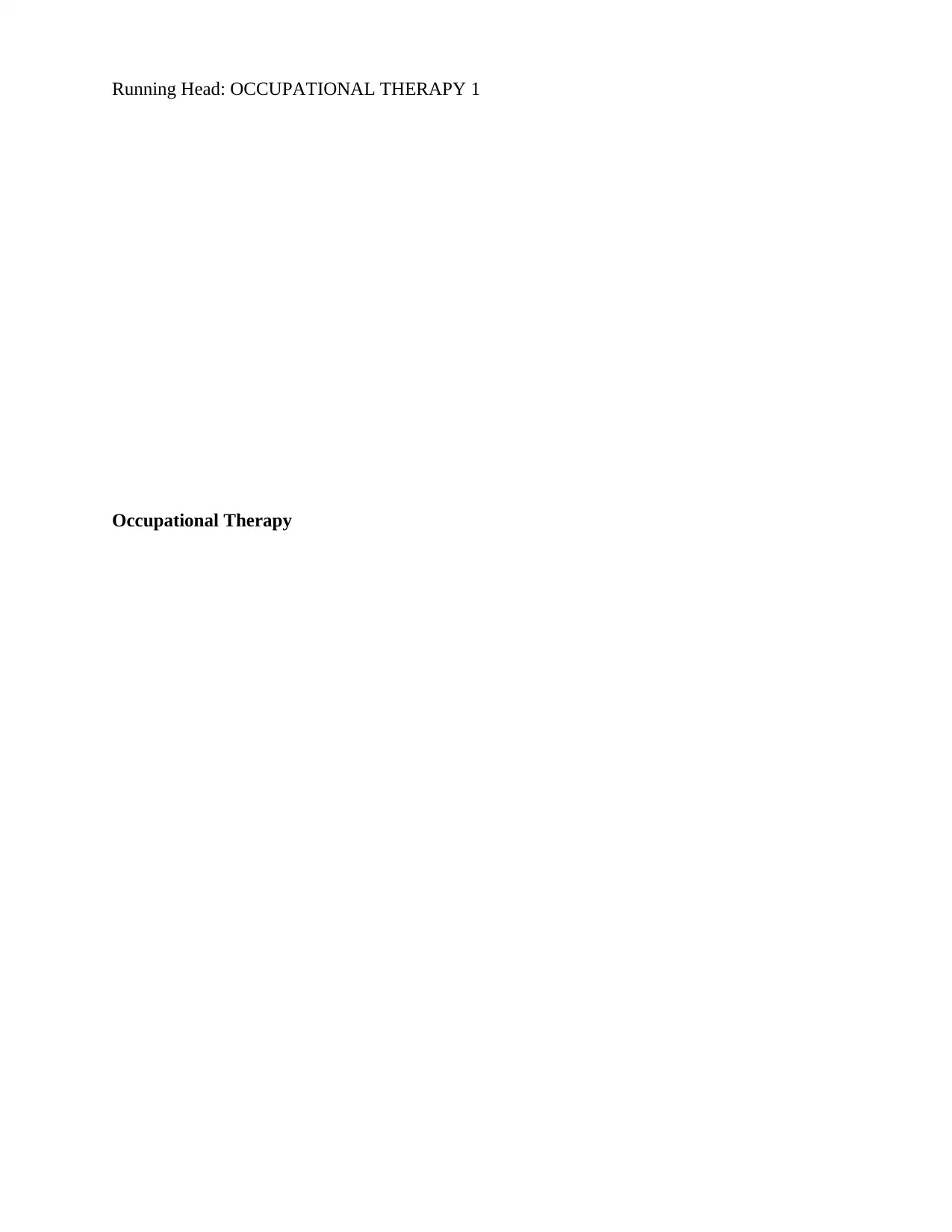
Running Head: OCCUPATIONAL THERAPY 1
Occupational Therapy
Occupational Therapy
Paraphrase This Document
Need a fresh take? Get an instant paraphrase of this document with our AI Paraphraser
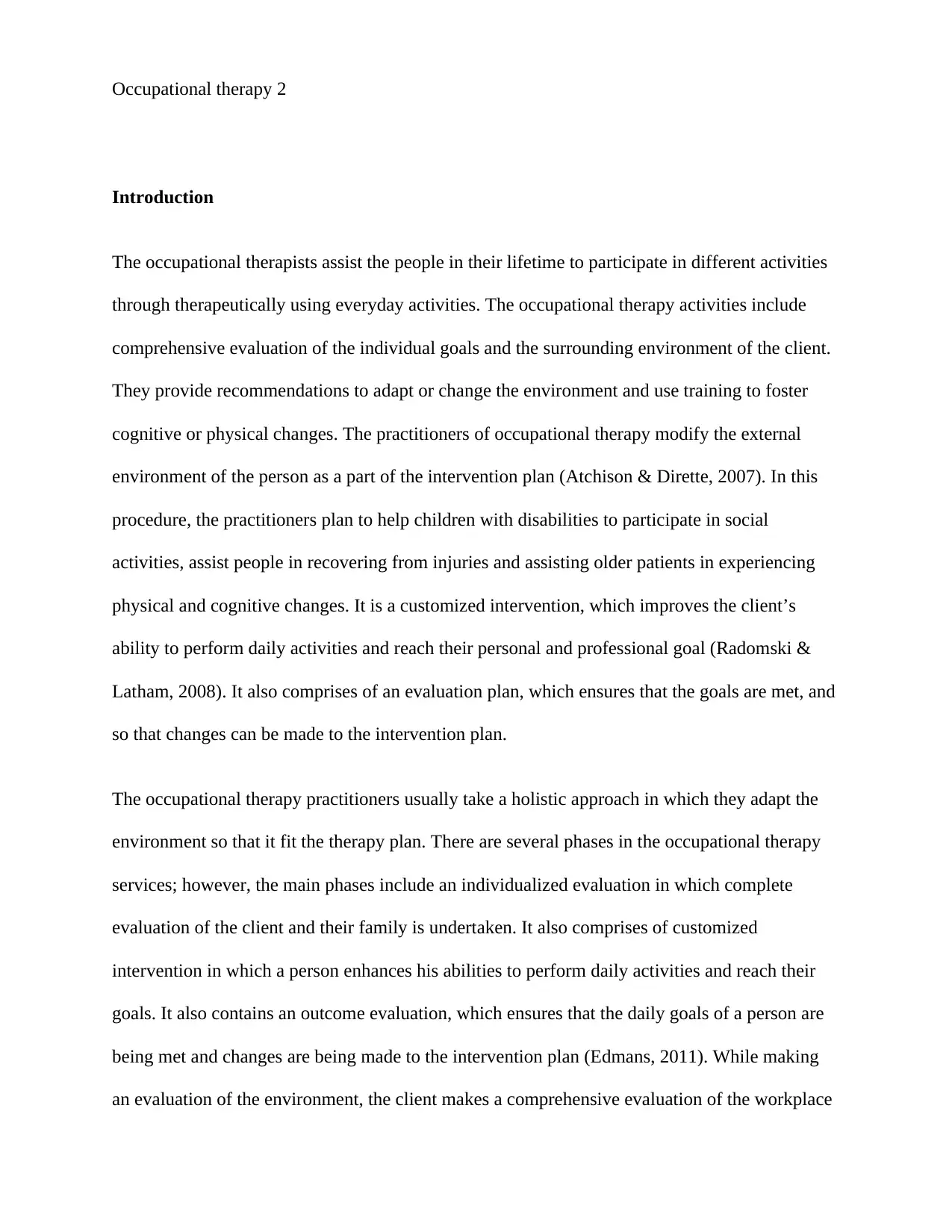
Occupational therapy 2
Introduction
The occupational therapists assist the people in their lifetime to participate in different activities
through therapeutically using everyday activities. The occupational therapy activities include
comprehensive evaluation of the individual goals and the surrounding environment of the client.
They provide recommendations to adapt or change the environment and use training to foster
cognitive or physical changes. The practitioners of occupational therapy modify the external
environment of the person as a part of the intervention plan (Atchison & Dirette, 2007). In this
procedure, the practitioners plan to help children with disabilities to participate in social
activities, assist people in recovering from injuries and assisting older patients in experiencing
physical and cognitive changes. It is a customized intervention, which improves the client’s
ability to perform daily activities and reach their personal and professional goal (Radomski &
Latham, 2008). It also comprises of an evaluation plan, which ensures that the goals are met, and
so that changes can be made to the intervention plan.
The occupational therapy practitioners usually take a holistic approach in which they adapt the
environment so that it fit the therapy plan. There are several phases in the occupational therapy
services; however, the main phases include an individualized evaluation in which complete
evaluation of the client and their family is undertaken. It also comprises of customized
intervention in which a person enhances his abilities to perform daily activities and reach their
goals. It also contains an outcome evaluation, which ensures that the daily goals of a person are
being met and changes are being made to the intervention plan (Edmans, 2011). While making
an evaluation of the environment, the client makes a comprehensive evaluation of the workplace
Introduction
The occupational therapists assist the people in their lifetime to participate in different activities
through therapeutically using everyday activities. The occupational therapy activities include
comprehensive evaluation of the individual goals and the surrounding environment of the client.
They provide recommendations to adapt or change the environment and use training to foster
cognitive or physical changes. The practitioners of occupational therapy modify the external
environment of the person as a part of the intervention plan (Atchison & Dirette, 2007). In this
procedure, the practitioners plan to help children with disabilities to participate in social
activities, assist people in recovering from injuries and assisting older patients in experiencing
physical and cognitive changes. It is a customized intervention, which improves the client’s
ability to perform daily activities and reach their personal and professional goal (Radomski &
Latham, 2008). It also comprises of an evaluation plan, which ensures that the goals are met, and
so that changes can be made to the intervention plan.
The occupational therapy practitioners usually take a holistic approach in which they adapt the
environment so that it fit the therapy plan. There are several phases in the occupational therapy
services; however, the main phases include an individualized evaluation in which complete
evaluation of the client and their family is undertaken. It also comprises of customized
intervention in which a person enhances his abilities to perform daily activities and reach their
goals. It also contains an outcome evaluation, which ensures that the daily goals of a person are
being met and changes are being made to the intervention plan (Edmans, 2011). While making
an evaluation of the environment, the client makes a comprehensive evaluation of the workplace
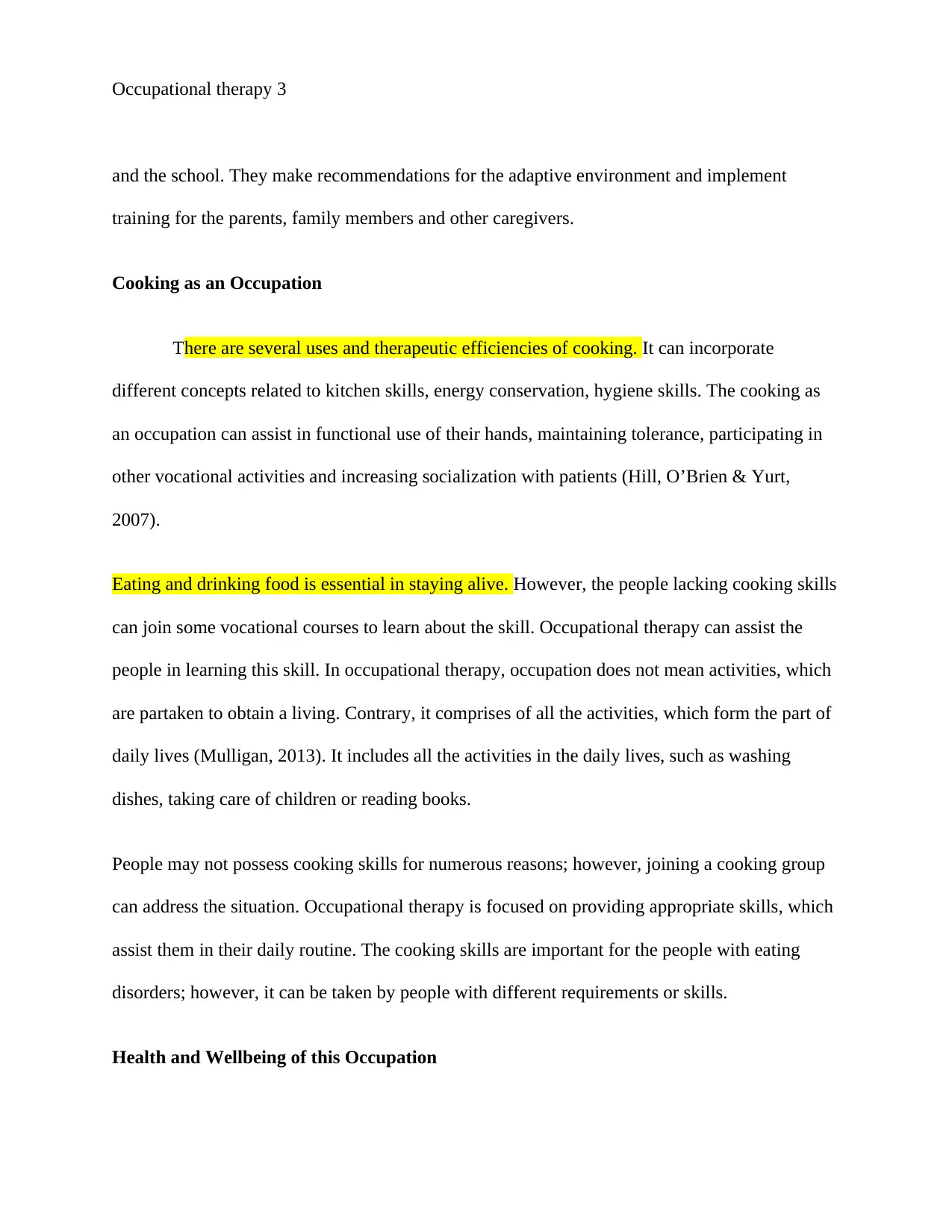
Occupational therapy 3
and the school. They make recommendations for the adaptive environment and implement
training for the parents, family members and other caregivers.
Cooking as an Occupation
There are several uses and therapeutic efficiencies of cooking. It can incorporate
different concepts related to kitchen skills, energy conservation, hygiene skills. The cooking as
an occupation can assist in functional use of their hands, maintaining tolerance, participating in
other vocational activities and increasing socialization with patients (Hill, O’Brien & Yurt,
2007).
Eating and drinking food is essential in staying alive. However, the people lacking cooking skills
can join some vocational courses to learn about the skill. Occupational therapy can assist the
people in learning this skill. In occupational therapy, occupation does not mean activities, which
are partaken to obtain a living. Contrary, it comprises of all the activities, which form the part of
daily lives (Mulligan, 2013). It includes all the activities in the daily lives, such as washing
dishes, taking care of children or reading books.
People may not possess cooking skills for numerous reasons; however, joining a cooking group
can address the situation. Occupational therapy is focused on providing appropriate skills, which
assist them in their daily routine. The cooking skills are important for the people with eating
disorders; however, it can be taken by people with different requirements or skills.
Health and Wellbeing of this Occupation
and the school. They make recommendations for the adaptive environment and implement
training for the parents, family members and other caregivers.
Cooking as an Occupation
There are several uses and therapeutic efficiencies of cooking. It can incorporate
different concepts related to kitchen skills, energy conservation, hygiene skills. The cooking as
an occupation can assist in functional use of their hands, maintaining tolerance, participating in
other vocational activities and increasing socialization with patients (Hill, O’Brien & Yurt,
2007).
Eating and drinking food is essential in staying alive. However, the people lacking cooking skills
can join some vocational courses to learn about the skill. Occupational therapy can assist the
people in learning this skill. In occupational therapy, occupation does not mean activities, which
are partaken to obtain a living. Contrary, it comprises of all the activities, which form the part of
daily lives (Mulligan, 2013). It includes all the activities in the daily lives, such as washing
dishes, taking care of children or reading books.
People may not possess cooking skills for numerous reasons; however, joining a cooking group
can address the situation. Occupational therapy is focused on providing appropriate skills, which
assist them in their daily routine. The cooking skills are important for the people with eating
disorders; however, it can be taken by people with different requirements or skills.
Health and Wellbeing of this Occupation
⊘ This is a preview!⊘
Do you want full access?
Subscribe today to unlock all pages.

Trusted by 1+ million students worldwide
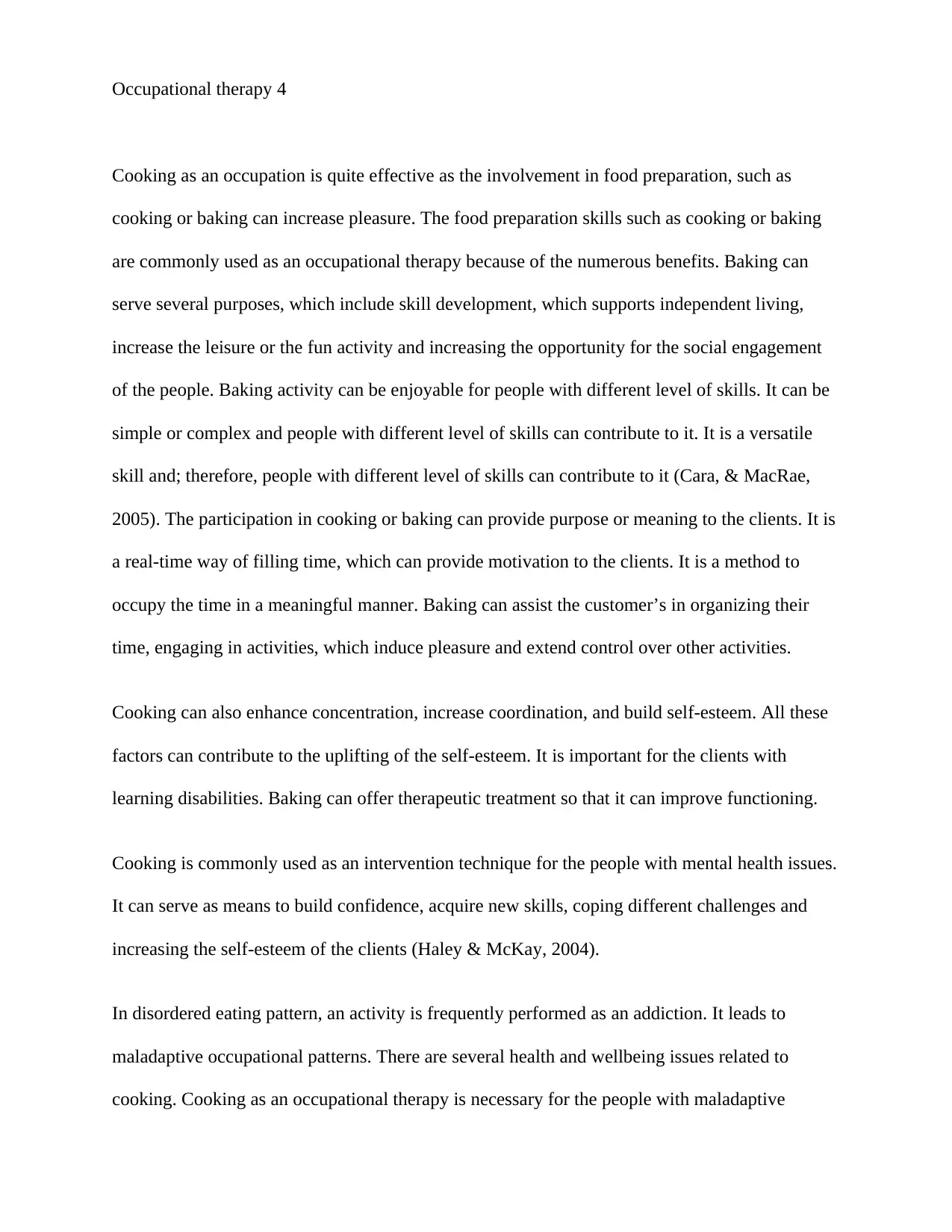
Occupational therapy 4
Cooking as an occupation is quite effective as the involvement in food preparation, such as
cooking or baking can increase pleasure. The food preparation skills such as cooking or baking
are commonly used as an occupational therapy because of the numerous benefits. Baking can
serve several purposes, which include skill development, which supports independent living,
increase the leisure or the fun activity and increasing the opportunity for the social engagement
of the people. Baking activity can be enjoyable for people with different level of skills. It can be
simple or complex and people with different level of skills can contribute to it. It is a versatile
skill and; therefore, people with different level of skills can contribute to it (Cara, & MacRae,
2005). The participation in cooking or baking can provide purpose or meaning to the clients. It is
a real-time way of filling time, which can provide motivation to the clients. It is a method to
occupy the time in a meaningful manner. Baking can assist the customer’s in organizing their
time, engaging in activities, which induce pleasure and extend control over other activities.
Cooking can also enhance concentration, increase coordination, and build self-esteem. All these
factors can contribute to the uplifting of the self-esteem. It is important for the clients with
learning disabilities. Baking can offer therapeutic treatment so that it can improve functioning.
Cooking is commonly used as an intervention technique for the people with mental health issues.
It can serve as means to build confidence, acquire new skills, coping different challenges and
increasing the self-esteem of the clients (Haley & McKay, 2004).
In disordered eating pattern, an activity is frequently performed as an addiction. It leads to
maladaptive occupational patterns. There are several health and wellbeing issues related to
cooking. Cooking as an occupational therapy is necessary for the people with maladaptive
Cooking as an occupation is quite effective as the involvement in food preparation, such as
cooking or baking can increase pleasure. The food preparation skills such as cooking or baking
are commonly used as an occupational therapy because of the numerous benefits. Baking can
serve several purposes, which include skill development, which supports independent living,
increase the leisure or the fun activity and increasing the opportunity for the social engagement
of the people. Baking activity can be enjoyable for people with different level of skills. It can be
simple or complex and people with different level of skills can contribute to it. It is a versatile
skill and; therefore, people with different level of skills can contribute to it (Cara, & MacRae,
2005). The participation in cooking or baking can provide purpose or meaning to the clients. It is
a real-time way of filling time, which can provide motivation to the clients. It is a method to
occupy the time in a meaningful manner. Baking can assist the customer’s in organizing their
time, engaging in activities, which induce pleasure and extend control over other activities.
Cooking can also enhance concentration, increase coordination, and build self-esteem. All these
factors can contribute to the uplifting of the self-esteem. It is important for the clients with
learning disabilities. Baking can offer therapeutic treatment so that it can improve functioning.
Cooking is commonly used as an intervention technique for the people with mental health issues.
It can serve as means to build confidence, acquire new skills, coping different challenges and
increasing the self-esteem of the clients (Haley & McKay, 2004).
In disordered eating pattern, an activity is frequently performed as an addiction. It leads to
maladaptive occupational patterns. There are several health and wellbeing issues related to
cooking. Cooking as an occupational therapy is necessary for the people with maladaptive
Paraphrase This Document
Need a fresh take? Get an instant paraphrase of this document with our AI Paraphraser
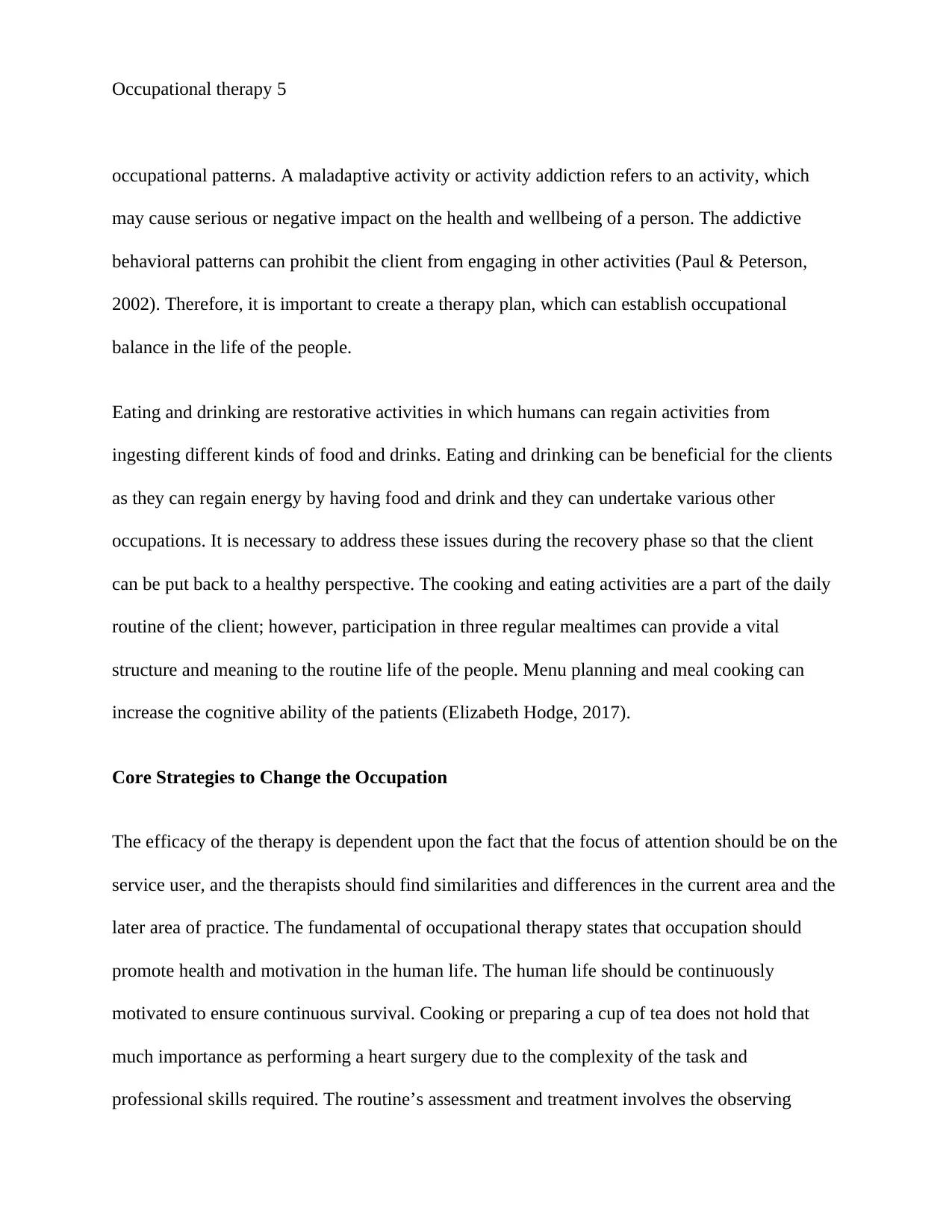
Occupational therapy 5
occupational patterns. A maladaptive activity or activity addiction refers to an activity, which
may cause serious or negative impact on the health and wellbeing of a person. The addictive
behavioral patterns can prohibit the client from engaging in other activities (Paul & Peterson,
2002). Therefore, it is important to create a therapy plan, which can establish occupational
balance in the life of the people.
Eating and drinking are restorative activities in which humans can regain activities from
ingesting different kinds of food and drinks. Eating and drinking can be beneficial for the clients
as they can regain energy by having food and drink and they can undertake various other
occupations. It is necessary to address these issues during the recovery phase so that the client
can be put back to a healthy perspective. The cooking and eating activities are a part of the daily
routine of the client; however, participation in three regular mealtimes can provide a vital
structure and meaning to the routine life of the people. Menu planning and meal cooking can
increase the cognitive ability of the patients (Elizabeth Hodge, 2017).
Core Strategies to Change the Occupation
The efficacy of the therapy is dependent upon the fact that the focus of attention should be on the
service user, and the therapists should find similarities and differences in the current area and the
later area of practice. The fundamental of occupational therapy states that occupation should
promote health and motivation in the human life. The human life should be continuously
motivated to ensure continuous survival. Cooking or preparing a cup of tea does not hold that
much importance as performing a heart surgery due to the complexity of the task and
professional skills required. The routine’s assessment and treatment involves the observing
occupational patterns. A maladaptive activity or activity addiction refers to an activity, which
may cause serious or negative impact on the health and wellbeing of a person. The addictive
behavioral patterns can prohibit the client from engaging in other activities (Paul & Peterson,
2002). Therefore, it is important to create a therapy plan, which can establish occupational
balance in the life of the people.
Eating and drinking are restorative activities in which humans can regain activities from
ingesting different kinds of food and drinks. Eating and drinking can be beneficial for the clients
as they can regain energy by having food and drink and they can undertake various other
occupations. It is necessary to address these issues during the recovery phase so that the client
can be put back to a healthy perspective. The cooking and eating activities are a part of the daily
routine of the client; however, participation in three regular mealtimes can provide a vital
structure and meaning to the routine life of the people. Menu planning and meal cooking can
increase the cognitive ability of the patients (Elizabeth Hodge, 2017).
Core Strategies to Change the Occupation
The efficacy of the therapy is dependent upon the fact that the focus of attention should be on the
service user, and the therapists should find similarities and differences in the current area and the
later area of practice. The fundamental of occupational therapy states that occupation should
promote health and motivation in the human life. The human life should be continuously
motivated to ensure continuous survival. Cooking or preparing a cup of tea does not hold that
much importance as performing a heart surgery due to the complexity of the task and
professional skills required. The routine’s assessment and treatment involves the observing
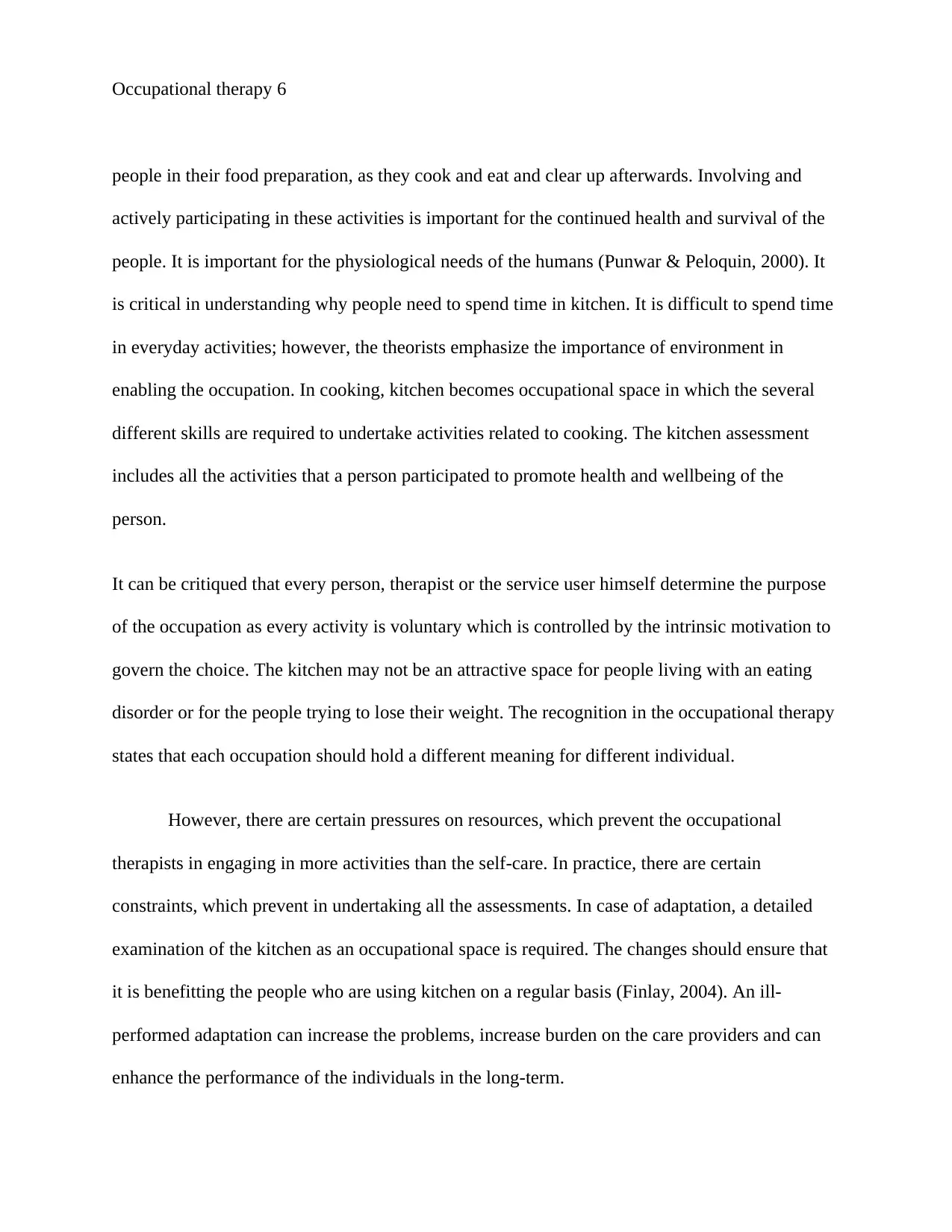
Occupational therapy 6
people in their food preparation, as they cook and eat and clear up afterwards. Involving and
actively participating in these activities is important for the continued health and survival of the
people. It is important for the physiological needs of the humans (Punwar & Peloquin, 2000). It
is critical in understanding why people need to spend time in kitchen. It is difficult to spend time
in everyday activities; however, the theorists emphasize the importance of environment in
enabling the occupation. In cooking, kitchen becomes occupational space in which the several
different skills are required to undertake activities related to cooking. The kitchen assessment
includes all the activities that a person participated to promote health and wellbeing of the
person.
It can be critiqued that every person, therapist or the service user himself determine the purpose
of the occupation as every activity is voluntary which is controlled by the intrinsic motivation to
govern the choice. The kitchen may not be an attractive space for people living with an eating
disorder or for the people trying to lose their weight. The recognition in the occupational therapy
states that each occupation should hold a different meaning for different individual.
However, there are certain pressures on resources, which prevent the occupational
therapists in engaging in more activities than the self-care. In practice, there are certain
constraints, which prevent in undertaking all the assessments. In case of adaptation, a detailed
examination of the kitchen as an occupational space is required. The changes should ensure that
it is benefitting the people who are using kitchen on a regular basis (Finlay, 2004). An ill-
performed adaptation can increase the problems, increase burden on the care providers and can
enhance the performance of the individuals in the long-term.
people in their food preparation, as they cook and eat and clear up afterwards. Involving and
actively participating in these activities is important for the continued health and survival of the
people. It is important for the physiological needs of the humans (Punwar & Peloquin, 2000). It
is critical in understanding why people need to spend time in kitchen. It is difficult to spend time
in everyday activities; however, the theorists emphasize the importance of environment in
enabling the occupation. In cooking, kitchen becomes occupational space in which the several
different skills are required to undertake activities related to cooking. The kitchen assessment
includes all the activities that a person participated to promote health and wellbeing of the
person.
It can be critiqued that every person, therapist or the service user himself determine the purpose
of the occupation as every activity is voluntary which is controlled by the intrinsic motivation to
govern the choice. The kitchen may not be an attractive space for people living with an eating
disorder or for the people trying to lose their weight. The recognition in the occupational therapy
states that each occupation should hold a different meaning for different individual.
However, there are certain pressures on resources, which prevent the occupational
therapists in engaging in more activities than the self-care. In practice, there are certain
constraints, which prevent in undertaking all the assessments. In case of adaptation, a detailed
examination of the kitchen as an occupational space is required. The changes should ensure that
it is benefitting the people who are using kitchen on a regular basis (Finlay, 2004). An ill-
performed adaptation can increase the problems, increase burden on the care providers and can
enhance the performance of the individuals in the long-term.
⊘ This is a preview!⊘
Do you want full access?
Subscribe today to unlock all pages.

Trusted by 1+ million students worldwide
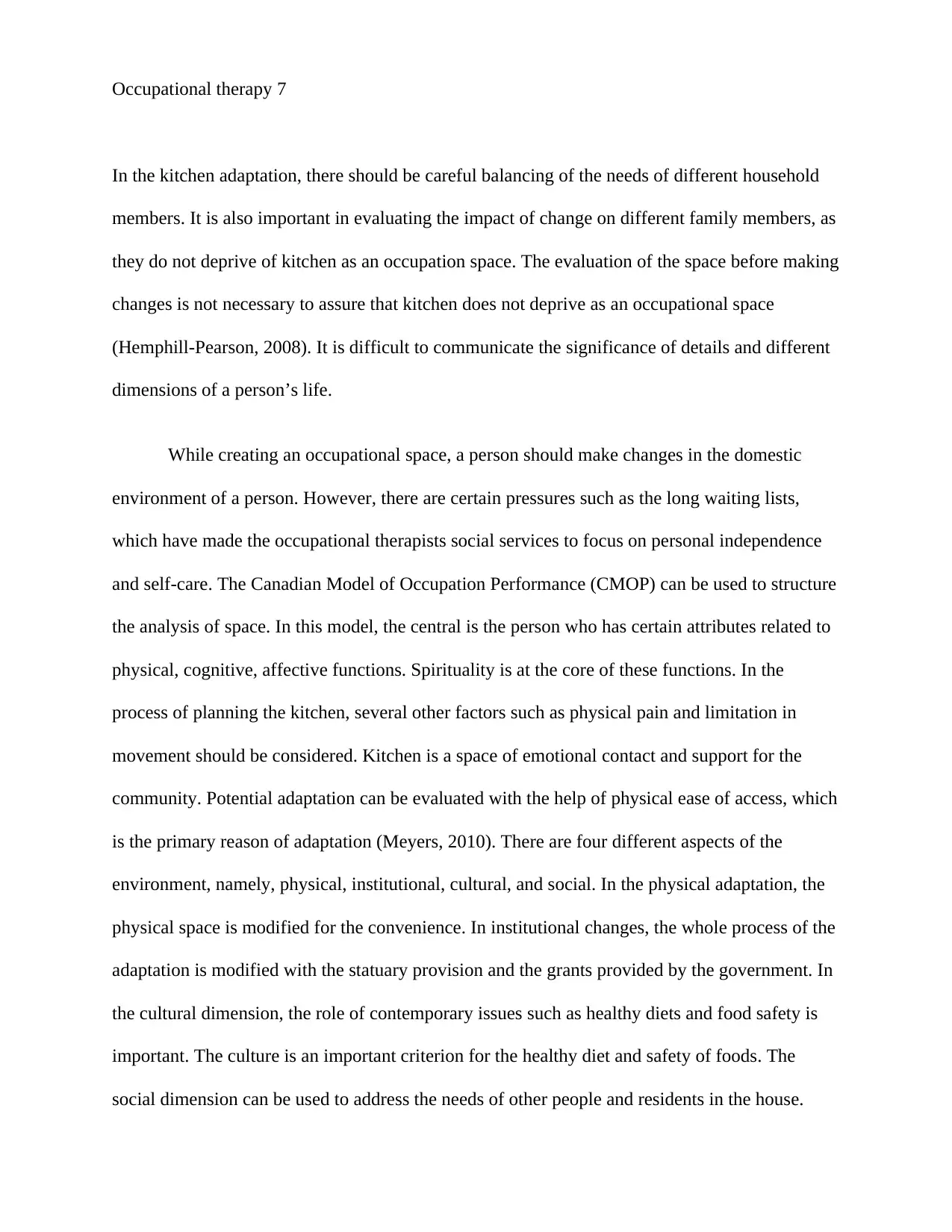
Occupational therapy 7
In the kitchen adaptation, there should be careful balancing of the needs of different household
members. It is also important in evaluating the impact of change on different family members, as
they do not deprive of kitchen as an occupation space. The evaluation of the space before making
changes is not necessary to assure that kitchen does not deprive as an occupational space
(Hemphill-Pearson, 2008). It is difficult to communicate the significance of details and different
dimensions of a person’s life.
While creating an occupational space, a person should make changes in the domestic
environment of a person. However, there are certain pressures such as the long waiting lists,
which have made the occupational therapists social services to focus on personal independence
and self-care. The Canadian Model of Occupation Performance (CMOP) can be used to structure
the analysis of space. In this model, the central is the person who has certain attributes related to
physical, cognitive, affective functions. Spirituality is at the core of these functions. In the
process of planning the kitchen, several other factors such as physical pain and limitation in
movement should be considered. Kitchen is a space of emotional contact and support for the
community. Potential adaptation can be evaluated with the help of physical ease of access, which
is the primary reason of adaptation (Meyers, 2010). There are four different aspects of the
environment, namely, physical, institutional, cultural, and social. In the physical adaptation, the
physical space is modified for the convenience. In institutional changes, the whole process of the
adaptation is modified with the statuary provision and the grants provided by the government. In
the cultural dimension, the role of contemporary issues such as healthy diets and food safety is
important. The culture is an important criterion for the healthy diet and safety of foods. The
social dimension can be used to address the needs of other people and residents in the house.
In the kitchen adaptation, there should be careful balancing of the needs of different household
members. It is also important in evaluating the impact of change on different family members, as
they do not deprive of kitchen as an occupation space. The evaluation of the space before making
changes is not necessary to assure that kitchen does not deprive as an occupational space
(Hemphill-Pearson, 2008). It is difficult to communicate the significance of details and different
dimensions of a person’s life.
While creating an occupational space, a person should make changes in the domestic
environment of a person. However, there are certain pressures such as the long waiting lists,
which have made the occupational therapists social services to focus on personal independence
and self-care. The Canadian Model of Occupation Performance (CMOP) can be used to structure
the analysis of space. In this model, the central is the person who has certain attributes related to
physical, cognitive, affective functions. Spirituality is at the core of these functions. In the
process of planning the kitchen, several other factors such as physical pain and limitation in
movement should be considered. Kitchen is a space of emotional contact and support for the
community. Potential adaptation can be evaluated with the help of physical ease of access, which
is the primary reason of adaptation (Meyers, 2010). There are four different aspects of the
environment, namely, physical, institutional, cultural, and social. In the physical adaptation, the
physical space is modified for the convenience. In institutional changes, the whole process of the
adaptation is modified with the statuary provision and the grants provided by the government. In
the cultural dimension, the role of contemporary issues such as healthy diets and food safety is
important. The culture is an important criterion for the healthy diet and safety of foods. The
social dimension can be used to address the needs of other people and residents in the house.
Paraphrase This Document
Need a fresh take? Get an instant paraphrase of this document with our AI Paraphraser
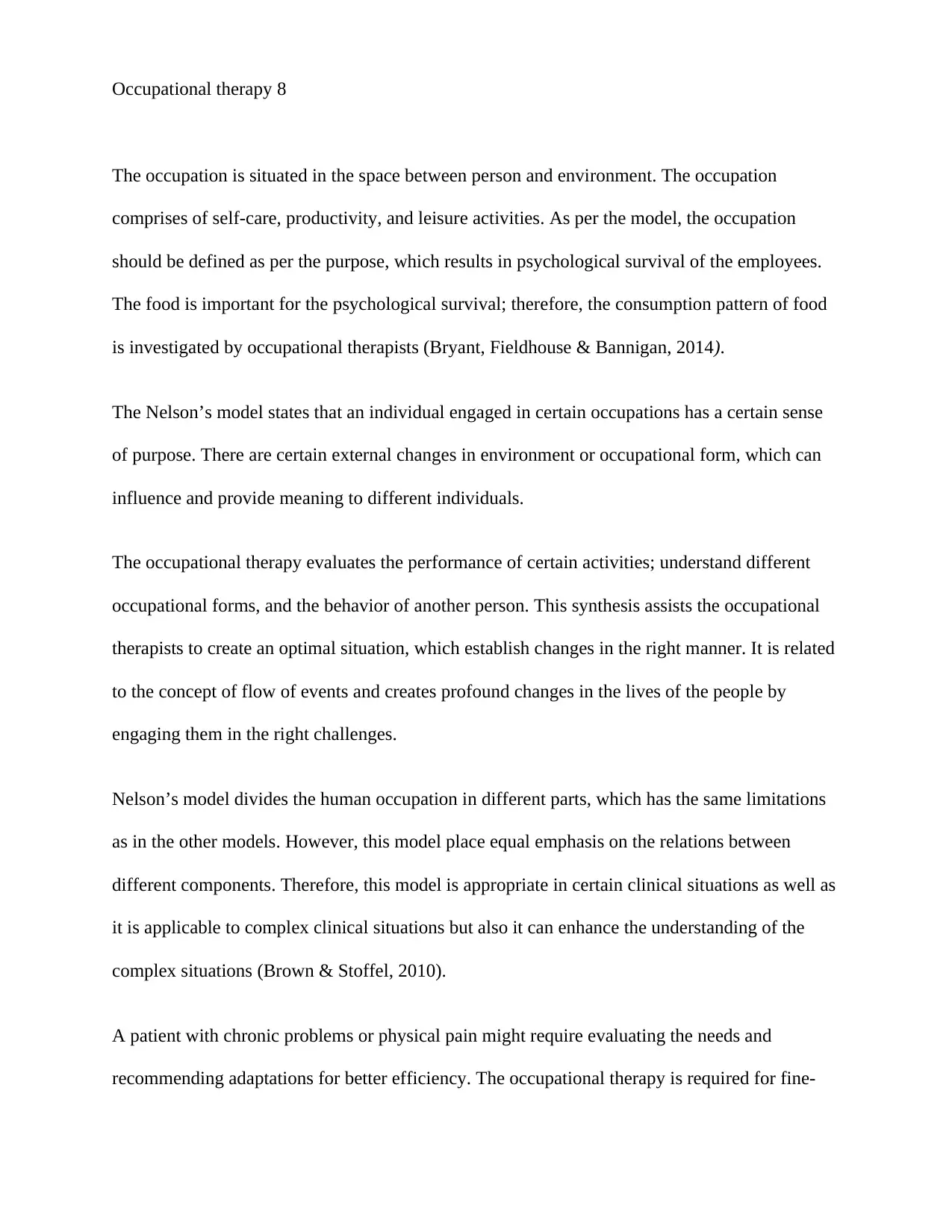
Occupational therapy 8
The occupation is situated in the space between person and environment. The occupation
comprises of self-care, productivity, and leisure activities. As per the model, the occupation
should be defined as per the purpose, which results in psychological survival of the employees.
The food is important for the psychological survival; therefore, the consumption pattern of food
is investigated by occupational therapists (Bryant, Fieldhouse & Bannigan, 2014).
The Nelson’s model states that an individual engaged in certain occupations has a certain sense
of purpose. There are certain external changes in environment or occupational form, which can
influence and provide meaning to different individuals.
The occupational therapy evaluates the performance of certain activities; understand different
occupational forms, and the behavior of another person. This synthesis assists the occupational
therapists to create an optimal situation, which establish changes in the right manner. It is related
to the concept of flow of events and creates profound changes in the lives of the people by
engaging them in the right challenges.
Nelson’s model divides the human occupation in different parts, which has the same limitations
as in the other models. However, this model place equal emphasis on the relations between
different components. Therefore, this model is appropriate in certain clinical situations as well as
it is applicable to complex clinical situations but also it can enhance the understanding of the
complex situations (Brown & Stoffel, 2010).
A patient with chronic problems or physical pain might require evaluating the needs and
recommending adaptations for better efficiency. The occupational therapy is required for fine-
The occupation is situated in the space between person and environment. The occupation
comprises of self-care, productivity, and leisure activities. As per the model, the occupation
should be defined as per the purpose, which results in psychological survival of the employees.
The food is important for the psychological survival; therefore, the consumption pattern of food
is investigated by occupational therapists (Bryant, Fieldhouse & Bannigan, 2014).
The Nelson’s model states that an individual engaged in certain occupations has a certain sense
of purpose. There are certain external changes in environment or occupational form, which can
influence and provide meaning to different individuals.
The occupational therapy evaluates the performance of certain activities; understand different
occupational forms, and the behavior of another person. This synthesis assists the occupational
therapists to create an optimal situation, which establish changes in the right manner. It is related
to the concept of flow of events and creates profound changes in the lives of the people by
engaging them in the right challenges.
Nelson’s model divides the human occupation in different parts, which has the same limitations
as in the other models. However, this model place equal emphasis on the relations between
different components. Therefore, this model is appropriate in certain clinical situations as well as
it is applicable to complex clinical situations but also it can enhance the understanding of the
complex situations (Brown & Stoffel, 2010).
A patient with chronic problems or physical pain might require evaluating the needs and
recommending adaptations for better efficiency. The occupational therapy is required for fine-
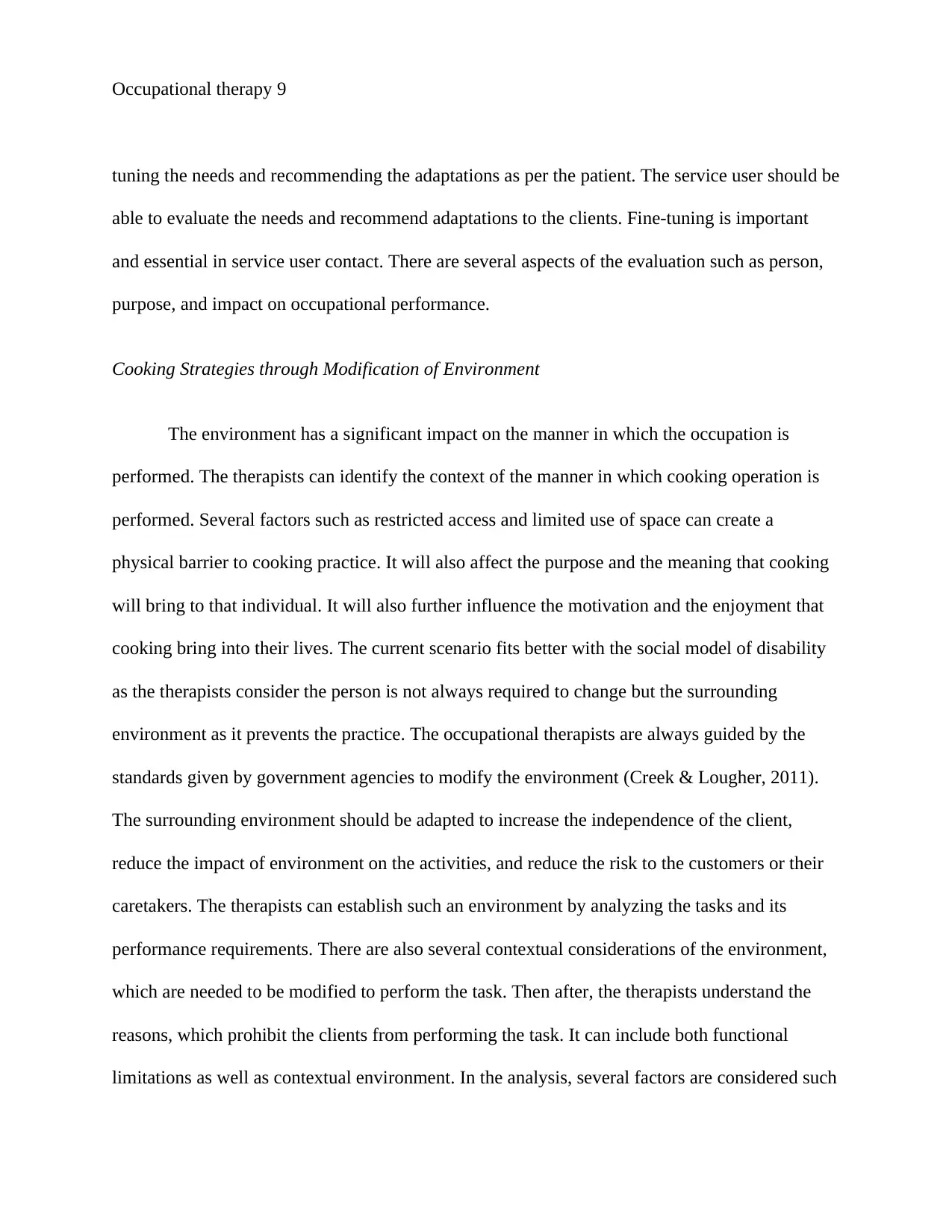
Occupational therapy 9
tuning the needs and recommending the adaptations as per the patient. The service user should be
able to evaluate the needs and recommend adaptations to the clients. Fine-tuning is important
and essential in service user contact. There are several aspects of the evaluation such as person,
purpose, and impact on occupational performance.
Cooking Strategies through Modification of Environment
The environment has a significant impact on the manner in which the occupation is
performed. The therapists can identify the context of the manner in which cooking operation is
performed. Several factors such as restricted access and limited use of space can create a
physical barrier to cooking practice. It will also affect the purpose and the meaning that cooking
will bring to that individual. It will also further influence the motivation and the enjoyment that
cooking bring into their lives. The current scenario fits better with the social model of disability
as the therapists consider the person is not always required to change but the surrounding
environment as it prevents the practice. The occupational therapists are always guided by the
standards given by government agencies to modify the environment (Creek & Lougher, 2011).
The surrounding environment should be adapted to increase the independence of the client,
reduce the impact of environment on the activities, and reduce the risk to the customers or their
caretakers. The therapists can establish such an environment by analyzing the tasks and its
performance requirements. There are also several contextual considerations of the environment,
which are needed to be modified to perform the task. Then after, the therapists understand the
reasons, which prohibit the clients from performing the task. It can include both functional
limitations as well as contextual environment. In the analysis, several factors are considered such
tuning the needs and recommending the adaptations as per the patient. The service user should be
able to evaluate the needs and recommend adaptations to the clients. Fine-tuning is important
and essential in service user contact. There are several aspects of the evaluation such as person,
purpose, and impact on occupational performance.
Cooking Strategies through Modification of Environment
The environment has a significant impact on the manner in which the occupation is
performed. The therapists can identify the context of the manner in which cooking operation is
performed. Several factors such as restricted access and limited use of space can create a
physical barrier to cooking practice. It will also affect the purpose and the meaning that cooking
will bring to that individual. It will also further influence the motivation and the enjoyment that
cooking bring into their lives. The current scenario fits better with the social model of disability
as the therapists consider the person is not always required to change but the surrounding
environment as it prevents the practice. The occupational therapists are always guided by the
standards given by government agencies to modify the environment (Creek & Lougher, 2011).
The surrounding environment should be adapted to increase the independence of the client,
reduce the impact of environment on the activities, and reduce the risk to the customers or their
caretakers. The therapists can establish such an environment by analyzing the tasks and its
performance requirements. There are also several contextual considerations of the environment,
which are needed to be modified to perform the task. Then after, the therapists understand the
reasons, which prohibit the clients from performing the task. It can include both functional
limitations as well as contextual environment. In the analysis, several factors are considered such
⊘ This is a preview!⊘
Do you want full access?
Subscribe today to unlock all pages.

Trusted by 1+ million students worldwide
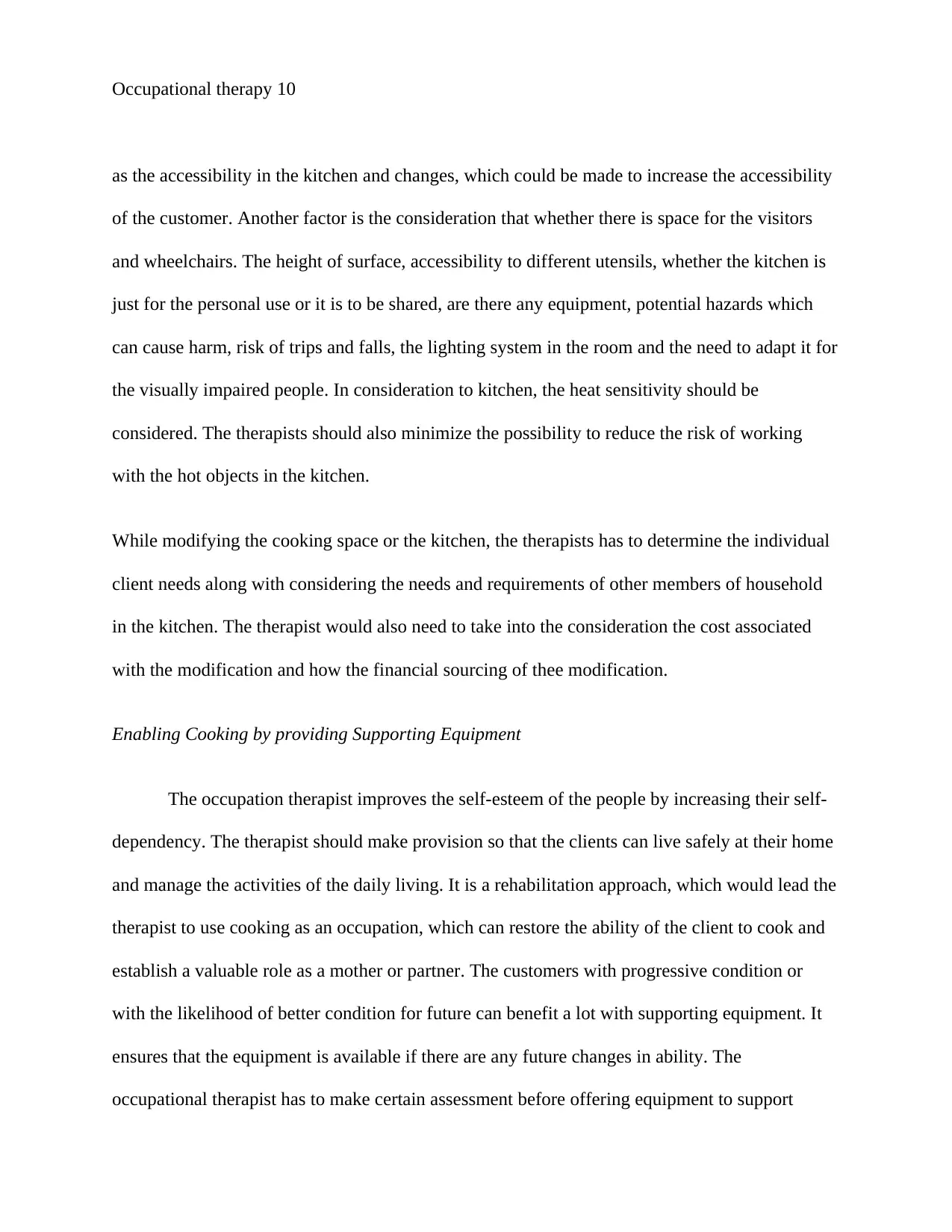
Occupational therapy 10
as the accessibility in the kitchen and changes, which could be made to increase the accessibility
of the customer. Another factor is the consideration that whether there is space for the visitors
and wheelchairs. The height of surface, accessibility to different utensils, whether the kitchen is
just for the personal use or it is to be shared, are there any equipment, potential hazards which
can cause harm, risk of trips and falls, the lighting system in the room and the need to adapt it for
the visually impaired people. In consideration to kitchen, the heat sensitivity should be
considered. The therapists should also minimize the possibility to reduce the risk of working
with the hot objects in the kitchen.
While modifying the cooking space or the kitchen, the therapists has to determine the individual
client needs along with considering the needs and requirements of other members of household
in the kitchen. The therapist would also need to take into the consideration the cost associated
with the modification and how the financial sourcing of thee modification.
Enabling Cooking by providing Supporting Equipment
The occupation therapist improves the self-esteem of the people by increasing their self-
dependency. The therapist should make provision so that the clients can live safely at their home
and manage the activities of the daily living. It is a rehabilitation approach, which would lead the
therapist to use cooking as an occupation, which can restore the ability of the client to cook and
establish a valuable role as a mother or partner. The customers with progressive condition or
with the likelihood of better condition for future can benefit a lot with supporting equipment. It
ensures that the equipment is available if there are any future changes in ability. The
occupational therapist has to make certain assessment before offering equipment to support
as the accessibility in the kitchen and changes, which could be made to increase the accessibility
of the customer. Another factor is the consideration that whether there is space for the visitors
and wheelchairs. The height of surface, accessibility to different utensils, whether the kitchen is
just for the personal use or it is to be shared, are there any equipment, potential hazards which
can cause harm, risk of trips and falls, the lighting system in the room and the need to adapt it for
the visually impaired people. In consideration to kitchen, the heat sensitivity should be
considered. The therapists should also minimize the possibility to reduce the risk of working
with the hot objects in the kitchen.
While modifying the cooking space or the kitchen, the therapists has to determine the individual
client needs along with considering the needs and requirements of other members of household
in the kitchen. The therapist would also need to take into the consideration the cost associated
with the modification and how the financial sourcing of thee modification.
Enabling Cooking by providing Supporting Equipment
The occupation therapist improves the self-esteem of the people by increasing their self-
dependency. The therapist should make provision so that the clients can live safely at their home
and manage the activities of the daily living. It is a rehabilitation approach, which would lead the
therapist to use cooking as an occupation, which can restore the ability of the client to cook and
establish a valuable role as a mother or partner. The customers with progressive condition or
with the likelihood of better condition for future can benefit a lot with supporting equipment. It
ensures that the equipment is available if there are any future changes in ability. The
occupational therapist has to make certain assessment before offering equipment to support
Paraphrase This Document
Need a fresh take? Get an instant paraphrase of this document with our AI Paraphraser
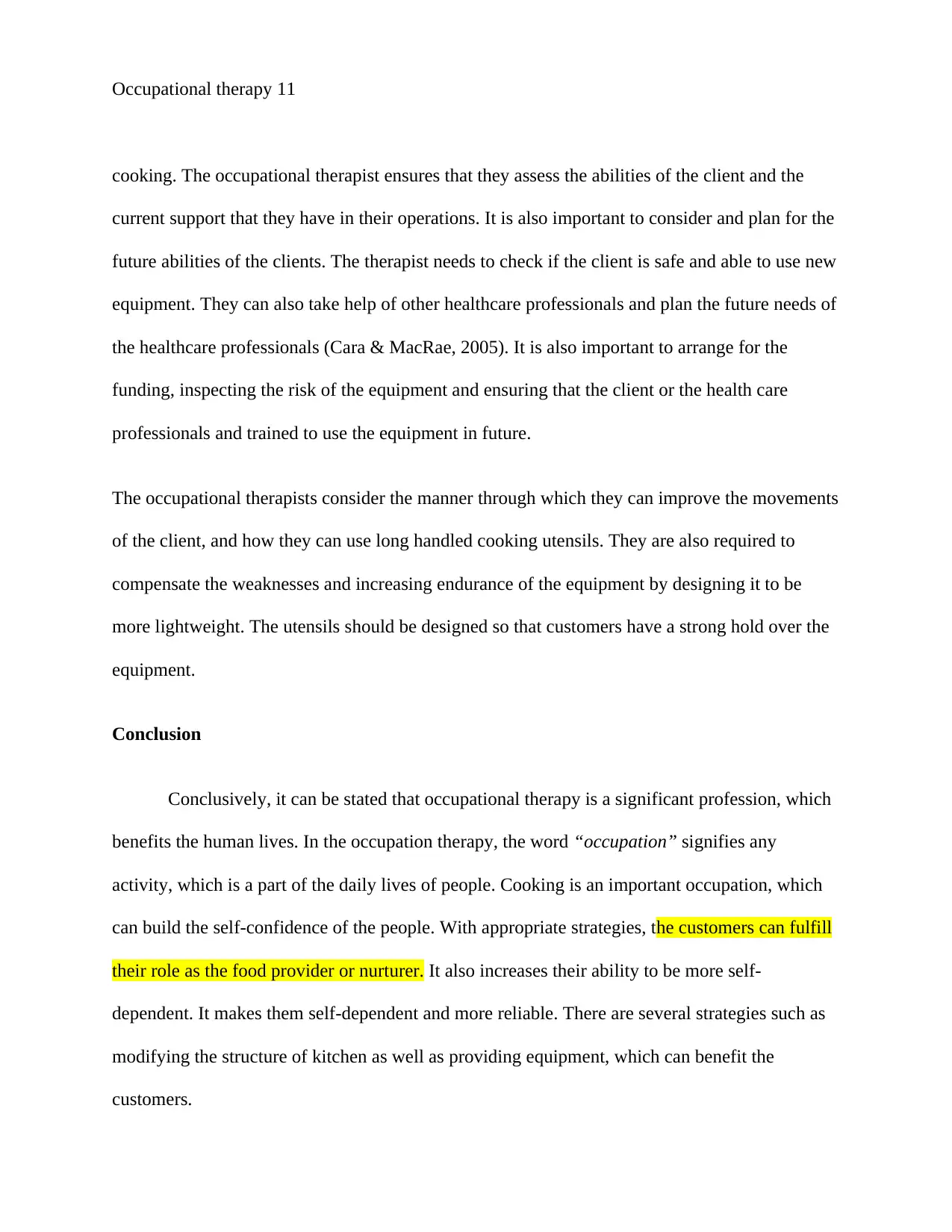
Occupational therapy 11
cooking. The occupational therapist ensures that they assess the abilities of the client and the
current support that they have in their operations. It is also important to consider and plan for the
future abilities of the clients. The therapist needs to check if the client is safe and able to use new
equipment. They can also take help of other healthcare professionals and plan the future needs of
the healthcare professionals (Cara & MacRae, 2005). It is also important to arrange for the
funding, inspecting the risk of the equipment and ensuring that the client or the health care
professionals and trained to use the equipment in future.
The occupational therapists consider the manner through which they can improve the movements
of the client, and how they can use long handled cooking utensils. They are also required to
compensate the weaknesses and increasing endurance of the equipment by designing it to be
more lightweight. The utensils should be designed so that customers have a strong hold over the
equipment.
Conclusion
Conclusively, it can be stated that occupational therapy is a significant profession, which
benefits the human lives. In the occupation therapy, the word “occupation” signifies any
activity, which is a part of the daily lives of people. Cooking is an important occupation, which
can build the self-confidence of the people. With appropriate strategies, the customers can fulfill
their role as the food provider or nurturer. It also increases their ability to be more self-
dependent. It makes them self-dependent and more reliable. There are several strategies such as
modifying the structure of kitchen as well as providing equipment, which can benefit the
customers.
cooking. The occupational therapist ensures that they assess the abilities of the client and the
current support that they have in their operations. It is also important to consider and plan for the
future abilities of the clients. The therapist needs to check if the client is safe and able to use new
equipment. They can also take help of other healthcare professionals and plan the future needs of
the healthcare professionals (Cara & MacRae, 2005). It is also important to arrange for the
funding, inspecting the risk of the equipment and ensuring that the client or the health care
professionals and trained to use the equipment in future.
The occupational therapists consider the manner through which they can improve the movements
of the client, and how they can use long handled cooking utensils. They are also required to
compensate the weaknesses and increasing endurance of the equipment by designing it to be
more lightweight. The utensils should be designed so that customers have a strong hold over the
equipment.
Conclusion
Conclusively, it can be stated that occupational therapy is a significant profession, which
benefits the human lives. In the occupation therapy, the word “occupation” signifies any
activity, which is a part of the daily lives of people. Cooking is an important occupation, which
can build the self-confidence of the people. With appropriate strategies, the customers can fulfill
their role as the food provider or nurturer. It also increases their ability to be more self-
dependent. It makes them self-dependent and more reliable. There are several strategies such as
modifying the structure of kitchen as well as providing equipment, which can benefit the
customers.

Occupational therapy 12
⊘ This is a preview!⊘
Do you want full access?
Subscribe today to unlock all pages.

Trusted by 1+ million students worldwide
1 out of 15
Related Documents
Your All-in-One AI-Powered Toolkit for Academic Success.
+13062052269
info@desklib.com
Available 24*7 on WhatsApp / Email
![[object Object]](/_next/static/media/star-bottom.7253800d.svg)
Unlock your academic potential
Copyright © 2020–2026 A2Z Services. All Rights Reserved. Developed and managed by ZUCOL.



